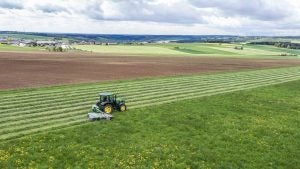Recently I stumbled on Xiaowei Wang’s TED talk called, Why Entrepreneurship Flourishes in the Countryside. It’s a talk that all farmers should listen to, as we often don’t give ourselves enough credit for our creativity and drive to do more.
Wang’s story starts in pearl ponds in rural China. She learned that when oysters are cracked open and pearls are harvested, the farmers will harvest the best pearls. The smaller ones are left in the oysters, which are then vacuum sealed shut and preserved. The oysters are left with valuable pearls inside so that they can be purchased in the U.S. for online “pearl parties,” where you live stream cracking open your pearl with friends.
It’s the entrepreneurship of farmers, Wang argues, that entertains the urbanites. Whether it’s shipping vacuum sealed oysters across the sea, selling “ugly produce” at a discounted price to persuade people to reduce food waste, or even making jewelry or house décor out of feathers, bones, skulls, and stones we find around the farm.
These types of entrepreneurship and partnerships are hardly headline worthy. Instead, the media talks about big businesses investing in agriculture, such as NetEase, a gaming company partnering up with a large hog farm in China to increase efficiency by bringing AI — artificial intelligence (not the AI you were perhaps thinking of!) — to the farm. Using AI, NetEase claims to improve hog rearing and breeding strategies by leaving the decisions to technology rather than our more fallible human eyes.
Wang says that “to see and understand the countryside is a crucial part of moving towards a more livable future for everyone.”
While AI companies investing in livestock operations help farmers to increase efficiency, this isn’t the entrepreneurship that Wang talks about flourishing in our countryside.
The only ones who understand our countryside are those who live and work in them, it’s the farmers who increase the value of “waste,” because we know that even when we raise the bar we still leave stragglers behind.
AI can tell us what hogs are worth raising and what hogs won’t finish well, but we still have to do something with our lower end hogs. AI can sort unripe and unfit veggies so we don’t need to do it by hand, which is wonderful, but what are we going to do with them all?
I believe that farmers forget that it’s their ingenuity that brings about big change. Think about Dennis Gonsalves, who grew up on a farm in Hawaii and later developed the GMO rainbow papaya to wipe out the papaya ringspot virus. How about when a young man named John Deere was sick of scraping mud off his cast iron plow so he invented the self scouring steel plow to save time and headaches.

Systems such as intensive grazing, crop rotations, and terraced farming are also the entrepreneurial things that farmers do, yet we don’t give ourselves credit for them.
When farmers create technology and systems to increase efficiency, decrease waste, and boost our ecosystems, we are feeding and entertaining the rest of the world, creating a livable future for all.
The progress that you make on the farm is also progress for the rest of the world, in one way or another! All farmers are entrepreneurs, and we are all contributing to a more livable future for all!
Elizabeth Maslyn is a born-and-raised dairy farmer from Upstate New York. Her passion for agriculture has driven her to share the stories of farmers with all consumers, and promote agriculture in everything she does. She works hard to increase food literacy in her community, and wants to share the stories of her local farmers.



